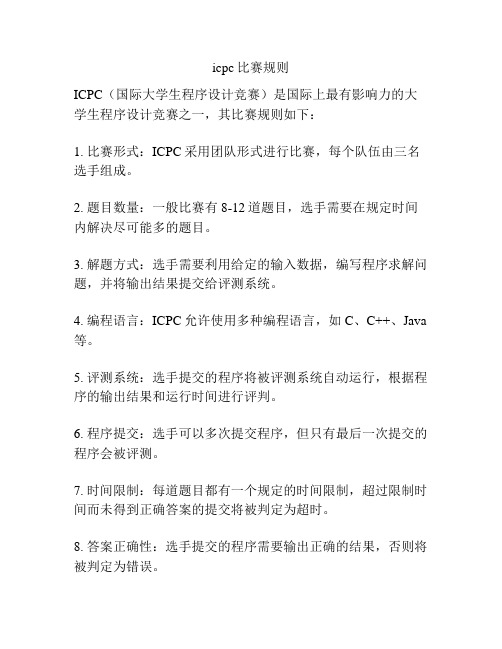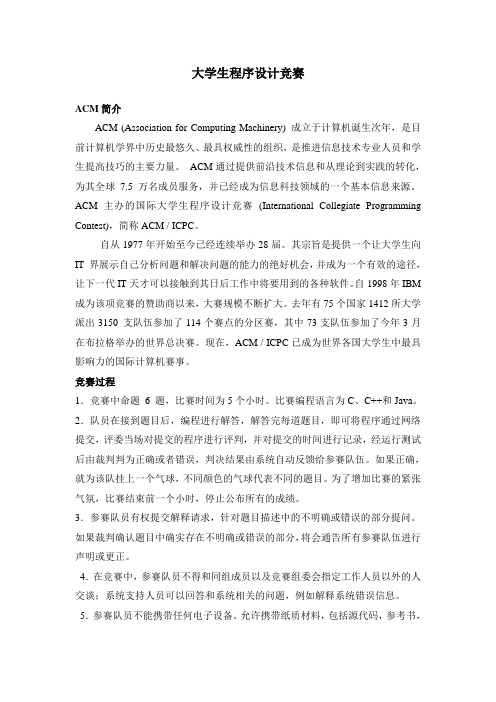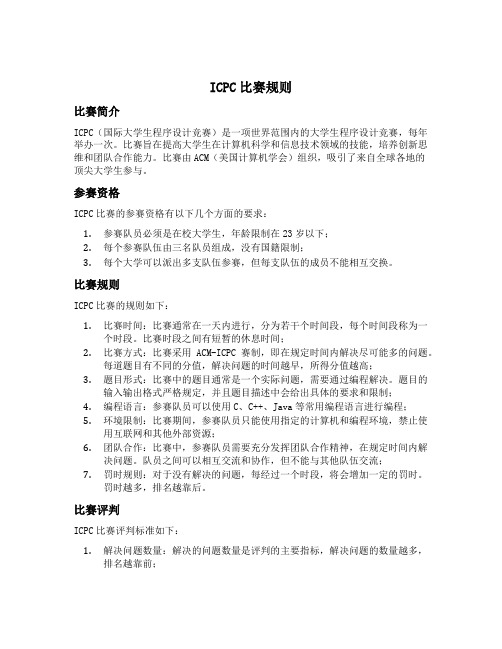ACM-ICPC简介和参赛规则
ACM-ICPC程序设计方法与实践

01
通过竞赛,参赛者可以锻炼编程能力和算法设计能力,提高解
决实际问题的能力。
提升团队协作能力
02
在团队赛中,参赛者需要相互协作,共同解决问题,提升团队
协作能力。
拓展国际视野
03
通过参与国际性的竞赛,参赛者可以了解不同国家和地区的计
算机科学和软件工程发展状况,拓展国际视野。
02 程序设计基础
数据结构基础
05 程序设计挑战与未来发展
程序设计挑战与解决方案
算法复杂度优化
针对大规模数据和复杂问题,需要不断 优化算法复杂度,以提高程序执行效率。
多线程与并行计算
随着多核处理器的普及,多线程和并 行计算成为程序设计的重要方向,以
提高计算性能。
代码可读性与可维护性
在编写代码时,应注重代码的可读性 和可维护性,以提高代码质量和可重 用性。
详细描述
贪心算法是一种在每一步选择中都采取当前状态下最好或最优的选择,从而希望导致结果是最好或最 优的算法。这种算法并不一定能够得到全局最优解,但在许多情况下可以获得近似最优解。贪心算法 的特点是快速、简洁、有效,因此在很多实际问题中被广泛应用。
动态规划
总结词
将原问题分解为若干个相互重叠的子问题,根据这些子问题的最优解来求解原问题的算 法。
01
02
03
数据结构定义
数据结构是计算机中数据 的组织方式,包括数据的 逻辑结构和物理结构。
数据结构分类
根据数据的性质和组织方 式,数据结构可分为线性 结构、树形结构、图形结 构和文件结构等。
数据结构应用
数据结构在程序设计、算 法实现、数据存储和检索 等方面具有重要作用。
算法基础
算法定义
ACM 国际大学生程序设计竞赛(ICPC) 规则

ACM 国际大学生程序设计竞赛(ICPC) 规则ACM 国际大学生程序设计竞赛(ICPC) 规则ACM 国际大学生程序设计竞赛(ICPC) 是全球最具影响力的大学生程序设计竞赛之一。
本文将简要介绍ACM ICPC的参赛规则和相关信息。
一、ACM ICPC 简介ACM ICPC 是一项面向大学生的年度性程序设计竞赛,始于1977年。
该竞赛的目标是鼓励大学生在编写和分析算法的过程中开拓思路,提高编程和解决问题的能力,培养团队协作精神。
二、参赛队伍1. 队伍组成每支参赛队伍由3名学生组成,其中最多可包括一名备用队员。
队员必须是在所属学校就读的全日制本科生。
2. 参赛资格参赛队员必须符合以下资格要求:- 未获得任何学位(包括本科学位);- 没有参加过之前的ACM ICPC 总决赛;- 通过所在学校的选拔赛和省级赛事等层层选拔。
三、竞赛环节1. 在线初赛ICPC竞赛的第一轮是在线初赛,根据不同地区的参赛队伍数量划分为多个赛区进行。
在指定时间内,队员需通过网络完成多个编程题目的解答。
2. 区域赛在线初赛的前若干名队伍将晋级到区域赛。
区域赛采用现场方式进行,由3个小时的算法设计和编程任务组成。
3. 总决赛区域赛的前若干名队伍将有资格参加ACM ICPC 的总决赛,争夺世界冠军。
总决赛通常由多场比赛组成,包括代码编写、程序设计和问题解答等环节。
四、竞赛规则1. 语言限定ICPC允许使用多种编程语言,包括但不限于C++、Java和Python。
参赛队伍需在规定的环境中编写代码并进行提交。
2. 时间限制每个竞赛环节都有严格的时间限制。
队伍必须在规定的时间内提交答案,否则无法计入成绩。
3. 题目难度竞赛题目按照难度分级,分为简单、中等和困难等级。
队伍需在规定时间内解决尽可能多的题目,并获得尽可能高的分数。
4. 团队合作ICPC强调团队合作,鼓励队员之间相互协作、交流和分享解题思路。
参赛队伍需充分发挥团队优势,高效配合,完成各项任务。
icpc比赛规则

icpc比赛规则
ICPC(国际大学生程序设计竞赛)是国际上最有影响力的大学生程序设计竞赛之一,其比赛规则如下:
1. 比赛形式:ICPC采用团队形式进行比赛,每个队伍由三名选手组成。
2. 题目数量:一般比赛有8-12道题目,选手需要在规定时间内解决尽可能多的题目。
3. 解题方式:选手需要利用给定的输入数据,编写程序求解问题,并将输出结果提交给评测系统。
4. 编程语言:ICPC允许使用多种编程语言,如C、C++、Java 等。
5. 评测系统:选手提交的程序将被评测系统自动运行,根据程序的输出结果和运行时间进行评判。
6. 程序提交:选手可以多次提交程序,但只有最后一次提交的程序会被评测。
7. 时间限制:每道题目都有一个规定的时间限制,超过限制时间而未得到正确答案的提交将被判定为超时。
8. 答案正确性:选手提交的程序需要输出正确的结果,否则将被判定为错误。
9. 比赛评分:根据解题数量和用时进行评分,解题数量多的队伍排名靠前,解题数量相同的队伍根据用时进行排名。
10. 奖项设置:比赛设有金、银、铜牌,根据排名进行评定,
并颁发奖杯和证书。
11. 正式赛和预选赛:ICPC通常分为正式赛和预选赛两个阶段,预选赛用来选拔出参加正式赛的队伍。
以上是ICPC比赛的一般规则,具体的比赛规则可能根据不同
的赛区和年度有所调整。
acm比赛要求

大学生程序设计竞赛ACM简介ACM (Association for Computing Machinery) 成立于计算机诞生次年,是目前计算机学界中历史最悠久、最具权威性的组织,是推进信息技术专业人员和学生提高技巧的主要力量。
ACM通过提供前沿技术信息和从理论到实践的转化,为其全球7.5万名成员服务,并已经成为信息科技领域的一个基本信息来源。
ACM主办的国际大学生程序设计竞赛(International Collegiate Programming Contest),简称ACM / ICPC。
自从1977年开始至今已经连续举办28届。
其宗旨是提供一个让大学生向IT 界展示自己分析问题和解决问题的能力的绝好机会,并成为一个有效的途径,让下一代IT天才可以接触到其日后工作中将要用到的各种软件。
自1998年IBM 成为该项竞赛的赞助商以来,大赛规模不断扩大。
去年有75个国家1412所大学派出3150 支队伍参加了114个赛点的分区赛,其中73支队伍参加了今年3月在布拉格举办的世界总决赛。
现在,ACM / ICPC已成为世界各国大学生中最具影响力的国际计算机赛事。
竞赛过程1.竞赛中命题6 题,比赛时间为5个小时。
比赛编程语言为C、C++和Java。
2.队员在接到题目后,编程进行解答,解答完每道题目,即可将程序通过网络提交,评委当场对提交的程序进行评判,并对提交的时间进行记录,经运行测试后由裁判判为正确或者错误,判决结果由系统自动反馈给参赛队伍。
如果正确,就为该队挂上一个气球,不同颜色的气球代表不同的题目。
为了增加比赛的紧张气氛,比赛结束前一个小时,停止公布所有的成绩。
3.参赛队员有权提交解释请求,针对题目描述中的不明确或错误的部分提问。
如果裁判确认题目中确实存在不明确或错误的部分,将会通告所有参赛队伍进行声明或更正。
4.在竞赛中,参赛队员不得和同组成员以及竞赛组委会指定工作人员以外的人交谈;系统支持人员可以回答和系统相关的问题,例如解释系统错误信息。
【综合】Acm竞赛简介

Parity(ceoi99)(肖天)
• 建立sum数组,sum[i]表示从1到i之和是奇(true)还是偶 (false),sum[0]=false。这样题目中给的任意问题(a,b) 的答案都可以用sum[b] xor sum[a-1]表示。 • 开始我们并不知道sum[1..n]的值,不妨设为false,这时任意 sum[a],sum[b]都是独立的。对于每对问答(a,b,c),都可以 知道sum[b] xor sum[a-1]=c,由此把sum[b]和sum[a-1] 联系起来。这步操作可以用并查集完成,对于问答(a,b,c)如 果sum[a-1],sum[b]不属于一个集合就把它们并起来,否则 如果sum[a-1] xor sum[b]不等于c则说明出现矛盾,输出总 句数,退出。 • 对于不出现矛盾的sum数组,对于每个集合分为两个部分,我 们指定其中一个部分为true,另一个部分为false,则可以确定 sum数组,利用sum[i] xor sum[i-1]可以求出第i位的数字, 由于不同集合之间没有问答出现,所以此数列是一可行解,证 明算法正确。
• 但有时却是最好的办法
22
Pizza Anyone? (ZOJ 1219)
• 题目大意: 你需要为你和你的朋友们订一个皮萨。 每个朋友都会告诉你他们想和不想放进皮萨 里的东西。 你是否能订一个皮萨,让他满足每个人 至少一个条件。 假设一共有16种东西可以放进皮萨。
23
2 65536
16
是个对计算机很 小的数
3
ACM
ACM (Association for Computing Machinery) 成立于计算机诞生次年,是目前计算机学界中历史最 悠久、最具权威性的组织,是推进信息技术专业人员 和学生提高技巧的主要力量。ACM通过提供前沿技 术信息和从理论到实践的转化,为其全球7.5万名成 员服务,并已经成为信息科技领域的一个基本信息来 源。
ACM-ICPC入门介绍

ACM/ICPC入门首先,我很高兴看到这届的学弟学妹们能有兴趣来关注我们学校的ACM/ICPC竞赛项目,那什么是ACM/ICPC呢?下面我就做个简单的介绍吧~ACM国际大学生程序设计竞赛(英文全称:ACM International Collegiate Programming Contest(ACM-ICPC或ICPC))是由美国计算机协会(ACM)主办的,一项旨在展示大学生创新能力、团队精神和在压力下编写程序、分析和解决问题能力的年度竞赛。
经过近30多年的发展,ACM国际大学生程序设计竞赛已经发展成为最具影响力的大学生计算机竞赛。
赛事目前由IBM公司赞助。
比赛期间,每队使用1台电脑需要在5个小时内使用C、C++或Java中的一种语言编写程序解决7到10个问题。
简单点说就是当今世界含金量最高的大学生编程竞赛。
可能很多同学现在刚刚学C++没几天,感觉编程是个很难的一件事,实际上练熟了的话也不是很难的~而参加ACM正是一个帮助你锻炼编程能力的很好的机会,毕竟如果大家毕业以后想从事IT行业的话,没有扎实的编程功底,显然是……那如何入门呢~在这我介绍国内一个很好的OJ网站,很适合初级和中级水平的ACM选手来练习,杭州电子科技大学的OJ网址——/所谓OJ就是Online Judge在线判断的意思,让你通过网络把你做的编程题的源码提交上去,让OJ的服务器判断你的代码是否正确。
这个是杭电OJ主界面的截图~右上方有个登陆和注册窗:点击Register new ID即可,然后会进入一个注册界面:把打星号的选项填完后,点下方的Submit就好了~ 那怎么去做题呢?主界面有个Problem Archive,点击进入后,就能看到上方的Volume代表你所选的是第几卷题目,每卷有一百道题,那么我们先来看看第1000题吧,这个是最简单的一个ACM题了~题目大意是输入两个数A和B,要求输出A + B的值,这个基本上上过C++课的都应该能写出代码来,但要注意的是,在OJ系统里,对代码是有要求的。
icpc比赛规则

icpc比赛规则【最新版】目录1.ICPC 比赛简介2.ICPC 比赛规则3.比赛时间与地点4.比赛形式与要求5.竞赛语言6.评分标准与奖项设置7.ICPC 比赛的意义正文【ICPC 比赛简介】国际大学生程序设计竞赛(International Collegiate Programming Contest,简称 ICPC)是一项全球范围内的大学生计算机程序设计竞赛,旨在发现和培养优秀的计算机程序设计人才。
该比赛由美国计算机学会(Association for Computing Machinery,简称 ACM)主办,自 1977 年创办以来,已经成为全球范围内最具影响力的大学生计算机程序设计竞赛之一。
【ICPC 比赛规则】ICPC 比赛的规则分为以下几个方面:1.参赛资格:参赛选手必须是全日制在校大学生,每所大学可以派出最多 3 支代表队参赛。
每支代表队由 3 名选手组成,选手在比赛期间需遵守比赛规则,不得抄袭他人程序或借助外部帮助。
2.比赛时间与地点:ICPC 比赛一般在每年的 9 月至 11 月期间进行,具体时间与地点由主办方公布。
比赛地点一般设在各大高校的计算机实验室。
3.比赛形式与要求:比赛采用团队赛制,每支代表队需在规定的时间内(一般为 5 小时)独立完成 8-10 道题目。
题目分为 A、B、C 三个难度等级,A 级题目较易,B 级题目适中,C 级题目较难。
参赛选手需按照题目要求,使用计算机编程语言编写程序,并提交到主办方提供的评测系统进行评测。
4.竞赛语言:ICPC 比赛允许使用的编程语言有多种,如 C++、Java、Python 等。
选手可以根据自己的熟悉程度选择合适的编程语言进行比赛。
5.评分标准与奖项设置:比赛评分按照题目的难度等级和完成时间进行。
A 级题目每道 10 分,B 级题目每道 20 分,C 级题目每道 30 分。
比赛结束后,根据各队的总分进行排名。
奖项设置一般为:金牌、银牌、铜牌。
icpc比赛规则

ICPC比赛规则比赛简介ICPC(国际大学生程序设计竞赛)是一项世界范围内的大学生程序设计竞赛,每年举办一次。
比赛旨在提高大学生在计算机科学和信息技术领域的技能,培养创新思维和团队合作能力。
比赛由ACM(美国计算机学会)组织,吸引了来自全球各地的顶尖大学生参与。
参赛资格ICPC比赛的参赛资格有以下几个方面的要求:1.参赛队员必须是在校大学生,年龄限制在23岁以下;2.每个参赛队伍由三名队员组成,没有国籍限制;3.每个大学可以派出多支队伍参赛,但每支队伍的成员不能相互交换。
比赛规则ICPC比赛的规则如下:1.比赛时间:比赛通常在一天内进行,分为若干个时间段,每个时间段称为一个时段。
比赛时段之间有短暂的休息时间;2.比赛方式:比赛采用ACM-ICPC赛制,即在规定时间内解决尽可能多的问题。
每道题目有不同的分值,解决问题的时间越早,所得分值越高;3.题目形式:比赛中的题目通常是一个实际问题,需要通过编程解决。
题目的输入输出格式严格规定,并且题目描述中会给出具体的要求和限制;4.编程语言:参赛队员可以使用C、C++、Java等常用编程语言进行编程;5.环境限制:比赛期间,参赛队员只能使用指定的计算机和编程环境,禁止使用互联网和其他外部资源;6.团队合作:比赛中,参赛队员需要充分发挥团队合作精神,在规定时间内解决问题。
队员之间可以相互交流和协作,但不能与其他队伍交流;7.罚时规则:对于没有解决的问题,每经过一个时段,将会增加一定的罚时。
罚时越多,排名越靠后。
比赛评判ICPC比赛评判标准如下:1.解决问题数量:解决的问题数量是评判的主要指标,解决问题的数量越多,排名越靠前;2.解决问题时间:对于解决同样数量的问题的队伍,通过比较解决问题的时间来进行排名。
解决问题的时间越短,排名越靠前;3.罚时计算:罚时是指比赛结束时队伍所累积的罚时,罚时越少,排名越靠前。
罚时的计算方式为:每道未解决的问题罚时为20分钟乘以问题的分值,并加上问题提交的罚时;4.结果公布:比赛结束后,组织方会根据评判标准计算各队的成绩,并公布排名和解题情况。
- 1、下载文档前请自行甄别文档内容的完整性,平台不提供额外的编辑、内容补充、找答案等附加服务。
- 2、"仅部分预览"的文档,不可在线预览部分如存在完整性等问题,可反馈申请退款(可完整预览的文档不适用该条件!)。
- 3、如文档侵犯您的权益,请联系客服反馈,我们会尽快为您处理(人工客服工作时间:9:00-18:30)。
ACM/ICPC(ACM International Collegiate Programming Contest, 国际大学生程序设计竞赛)是由国际计算机界历史悠久、颇具权威性的组织ACM(Association for Computing Machinery,国际计算机协会)主办的,世界上公认的规模最大、水平最高的国际大学生程序设计竞赛。
1.ACM-ICPC的历史及其影响ACM/ICPC从1970年开始,已经举办了30多届,其目的旨在使大学生运用计算机来充分展示自己分析问题和解决问题的能力。
该竞赛一直受到国际各知名大学的重视,并受到全世界各著名计算机公司的高度关注。
可以说,ACM国际大学生程序设计竞赛已成为世界各国大学生最具影响力的国际级计算机类的赛事。
2.ACM-ICPC的比赛形式和内容ACM/ICPC采用组队参赛的形式,由三名队员组成一支队伍参赛。
比赛时三名队员只使用一台电脑,整个比赛时间为5个小时。
比赛题目为6~10道不等,全英文。
标准的程序数据输入和输出解答要求。
选手们必须根据题目内容设计算法,并完成相应的功能要求。
该队程序如果能在规定时间内得出正确的答案视为通过。
队伍通过的题目数量多的在比赛中排名越高,题目数相同的则用时越少的排名越高。
3.竞赛内容竞赛涵盖的范围很广,大致划分如下:Direct(简单题),Computational Geometry(计算几何),Number Theory(数论),Combinatorics (组合数学),Search Techniques(搜索技术),Dynamic Programming(动态规划),Graph Theory(图论),Other(其他)可使用的计算机语言:C语言、C++,JAVA竞赛规则参赛队组成1. 教练是参加队伍所代表学校认定的正式教师,教练必须保证所有队员符合本规则的规定。
教练作为参赛队伍代表,负责竞赛活动中的联系工作。
2. 只有当赛区组委会从教练处获得所有保证队伍合格的资料后,一支队伍才能获得参赛的资格。
3. 每只队伍有三名参赛队员组成。
4. 参赛队员为软件工程、计算机科学与技术或相关专业的在校本科大学生。
5. 参赛队报名按照先到先得的原则受理。
为了使更多的学校获得参赛的机会,学校或者学院报名若在一队以上,除第一队以外,其他队伍会在报名截止后两周内收到是否获得参赛资格的通知。
比赛规则1. 竞赛中至少命题6题,至多命题10题,比赛时间为5个小时。
2. 参赛队员可以携带诸如书、手册、程序清单等纸质参考资料,但不能携带电子资料,如采用U盘携带程序。
3. 试题的解答提交裁判称为运行,每一次运行会被判为正确或者错误,判决结果会及时通知参赛队伍。
4. 正确解答中等数量以及中等数量以上试题的队伍会根据解题数目进行排名,解题数在中等数量以下的队伍会得到确认但不会进行排名。
如果多支队伍解题数量相同,则根据总用时加上惩罚时间进行排名。
总用时和惩罚时间由每道解答正确的试题的用时加上惩罚时间组成。
每道试题用时将从竞赛开始到试题解答被判定为正确为止,其间每一次错误的运行将被加罚20分钟时间,未正确解答的试题不记时。
5. 竞赛语言包括C++、C和Java。
6. 每支队伍使用一台计算机,所有队伍使用计算机的规格和配置完全相同。
奖励办法获得竞赛1-10名队伍的参赛选手为一等奖,11-20名队伍的参赛选手为二等奖,21-30名队伍的参赛选手为三等奖;省信息产业厅和省教育厅向获奖选手颁发荣誉证书。
设“优秀教练奖”5名,省信息产业厅和省教育厅向获奖教练颁发荣誉证书和奖品。
Regional RulesMissionThe ACM International Collegiate Programming Contest (ICPC) provides college students with opportunities to interact with students from other universities and to sharpen and demonstrate their problem-solving, programming, and teamwork skills. The contest provides a platform for ACM, industry, and academia to encourage and focus public attention on the next generation of computing professionals as they pursue excellence.IntroductionThe contest is a two-tiered competition among teams of students representing institutions of higher education. Teams first compete in regional contests held around the world from September to November each year. The winning team from each regional contest qualifies to advance to the ACM International Collegiate Programming Contest World Finals, typically held the following March to mid-April. Additional high-ranking teams may be invited to the World Finals as wild card teams.OrganizationThe ICPC International Steering Committee is responsible for establishing contest rules, policy and guidelines. They oversee the conducting of regional contests, resolve regional appeals, rule on international issues, recommend ways to make the contest accessible and attractive to international participants and review variances in regional rules. There are two standing subcommittees, the Appeals Committee and the Eligibility Committee.The ICPC is organized according to the ICPC Policies and Procedures. For each regional contest, the Regional Contest Director (RCD) is charged with executing a regional contest in accordance with the regional rules and ICPC polic ies, procedures, and guidelines. Regional rules may vary to accommodate differences in educational systems and host computing facilities. Additional rules, exceptions, and other information pertaining to a specific regional contest can be found at the Regionals Contest Website. Those rules do not supersede these rules or the World Finals rules.LocalizationThe language of the Contest is English. All written contest materials will be in English. Additional languages may be used in regional contests. Terms which have undefined or different meanings outside the United States must be defined or redefined appropriately in that region's Region-Specific Rules. Rules may vary at the regional level to accommodate these differences.T eam CompositionA representative of the sponsoring institution of higher education, typically a faculty member, must serve as or designate the team coach. The coach certifies the eligibility of contestants and serves as the official point-of-contact with the team prior to and during contest activities. A team may only have one coach.The coach must fully register teams in the ICPC Registration System within the time set by the regional rules which, for all Regional Contests, is no later than the earlier date of 7 days before the contest and November 8. A team is not eligible to compete in the regional contest until the regional contest director has accepted the team in the web registration system. Teams failing to comply with any of these requirements will be ruled ineligible to compete. Only registered reserves may be substituted for contestants. Such substitutions must be entered in the ICPC Registration System by the regional contest director before the contest begins.Each team consists of three contestants who are eligible to compete in the ICPC World Finals as described under Advancing to the World Finals. The team's contestants must satisfy the following eligibility rules.Contestant Eligibility Rules - Please refer to the Eligibility Decision Tree to more easily determine eligibilityBasic Requirements•A student must be willing and able to compete in the World Finals.•A student must be enrolled in a degree program at the sponsoring institution with at least a half-time load. This rule is not to be construed as disqualifying co-op students, exchange students, or students serving internships.•A student may compete for only one institution during a contest year.•A student who has competed in two World Finals is NOT eligible to compete.•A student who has competed in five Regional Contests is NOT eligible to compete.Period of Eligibility•A student who meets the Basic Requirements and FIRST began post-secondary studies in 2004 or later is eligible to compete.•A student who meets the Basic Requirements and was born in 1985 or later is eligible to compete.Extending the Period of Eligibility•A coach may petition the ICPC Eligibility Committee to extend the Period of Eligibility for a student whose full-time studies have been interrupted or extended. This includes military or civilian service, illness, work/studies, or personal reasons.•The coach must demonstrate that such an extension would not provide an unfair advantage to the team.•A petition will be approved routinely if the student meets the Basic Requirements and has not completed more than the equivalent of eight semesters of full-time study as of the date of the regional contest.•To make such a request, the coach must petition the ICPC Eligibility Committee at least three weeks before the regional contest. The ICPC Eligibility Committee will render a decision within five business days.Where to CompeteEach team is expected to compete only within its defined region. However, a team with a valid reason (e.g. driving distance) may request to compete in a different region for a given year. The team coach must submit such a request to the Director of Regional Contests(DRC), who will approve the request only if the decision is unanimous among all affected Directors.An institution may send contestants to only one regional contest in a given year.Regional Contest AttendanceAll team members must attend all contest activities as specified by the regional contest director for that region. The coach is expected to attend or be available by phone during contest activities. Failure to attend any of the designated contest events will result in automatic disqualification and forfeiture of any scholarships and prizes.Conduct of a Regional ContestSolutions to problems submitted for judging are called runs. Each run is judged as accepted or rejected by a judge, and the team is notified of the results.Notification of accepted runs may be suspended at an appropriate time to keep the final results secret. A general announcement to that effect will be made during the contest. Notification of rejected runs will continue until the end of the contest.A contestant may submit a claim of ambiguity or error in a problem statement by submitting a clarification request to a judge. If the judges agree that an ambiguity or error exists, a clarification will be issued to all contestants.Contestants are not to converse with anyone except members of their team and personnel designated by the regional contest director. Systems support staff may advise contestants on system-related problems such as explaining system error messages.While the contest is scheduled for a particular time length (typically five hours), the regional contest director has the authority to alter the length of the contest in the event of unforeseen difficulties. Should the contest duration be altered, every attempt will be made to notify contestants in a timely and uniform manner.A team may be disqualified by the regional contest director for any activity that jeopardizes the contest such as dislodging extension cords, unauthorized modification of contest materials, or distracting behavior.At least six problems will be posed. So far as possible, problems will avoid dependence on detailed knowledge of a particular applications area or particular contest language.Scoring of a Regional ContestA problem is solved when it is accepted by the judges. The judges are solely responsible for accepting or rejecting submitted runs. In consultation with the judges, the Regional Contest Director determines the winners of the regional contest. The regional contest director and judges are empowered to adjust for or adjudicate unforeseen events and conditions. Their decisions are final.Teams are ranked according to the most problems solved. For the purposes of awards, or in determining qualifier(s) for the World Finals, teams who solve the same number of problems are ranked by least total time. The total time is the sum of the time consumed for each problem solved. The time consumed for a solved problem is the time elapsed from the beginning of the contest to the submittal of the accepted run plus 20 penalty minutes for every rejected run for that problem regardless of submittal time. There is no time consumed for a problem that is not solved.It is the responsibility of the Regional Contest Director to specify any additional tie-breakers. Tie-breaker policies must be announced to contestants before the contest begins.Regional Contest Computing EnvironmentThe programming languages of the regional contest will include C/C++. Additional programming languages may be used. The programming languages of the World Finals are Java and C/C++. Prior to the World Finals, the judges will have solved all problems in Java and C/C++.Each team will use a single workstation. The regional contest director is responsible for determining that teams have reasonably equivalent computing resources.Each Regional Contest Director determines whether contestants may bring materials for use during the contest. Please see the specific regional rules at the ICPC Regional Contest Web Site - regionals. At the World Finals, no printed materials or electronic devices may be brought into the contest area. On-line reference materials will be made available as described at the ICPC World Finals Reference Materials Site. Each team will be permitted to provide a PDF of up to 25 pages of notes within the limits described during Team Certification. Three copies will be printed and placed at the team's workstation for use during the World Finals.Complaints, Appeals, and RemediesIf irregularities or misconduct are observed during the contest, team members or coaches should bring them to the attention of the contest officials so that action may be taken as soon as possible. After the conclusion of the contest and the results have been made public, coaches may file complaints or appeals as follows:If irregularities or misconduct are observed during the contest, team members or coaches should bring them to the attention of the contest officials so that action may be taken as soon as possible. After the conclusion of the contest and the results have been made public, coaches may file complaints or appeals as follows:Within 2 business daysThe coach may file a complaint by sending an email containing a text message with no enclosures to the Contest Manager. The Contest Manager will forward the complaint to the Regional Contest Director, Super Regional Director, and Director of Regional Contests, copying the coach.Within 3 more business daysThe RCD shall respond to the complaint.Within 1 more business dayThe coach may file an appeal by sending email to the Contest Manager who will forward the appeal to the Appeals Committee copying the coach and RCD.Within 4 more business daysThe Appeals Committee will investigate the circumstances of the appeal and notify the coach and RCD of their decision.This process is governed as follows:•The results of the regional contest are not final until the complaints and appeals process has run its course.•Only coaches may file complaints and appeals.•An appeal must be based on one or more of the following circumstances: violations of the Rules, misconduct by teams, or gross misconduct by contest officials with the intent to do harm.•The decisions of the judges are final. Specifically, a decision on a problem submission MAY NOT be appealed.* The Appeals Committee overturns decisions only under extraordinary circumstances.•The decision of the Appeals Committee is final.•No additional finals invitations will be given to remedy to a complaint.•All complaints will be acknowledged.The appeal will be automatically rejected if the above procedure is not followed.Advancing to the World FinalsTeams qualify to advance to the World Finals through Regional Contests and by satisfying all rules posted in The Rules of the ACM-ICPC World Finals. Specifically:Only one team from a given institution may advance to the World Finals. Team members will be provided free one-year memberships in ACM at On-Site Registration. No team member on the qualifying team may have competed as a contestant in two previous World Finals.The coach of a qualifying team is the point-of-contact prior to and during World Finals activities. The coach must complete certification at the Team Certification Web Site within five (5) business days of notification. Qualifying teams will be issued an invitation by email and postal mail within one business day of completing certification.Qualifying teams requiring visas must initiate the process of applying for visas within 10 business days of being issued an invitation. Teams failing to comply with any of these requirements will be ruled ineligible to compete in the World Finals. Upon completion of these requirements, a qualifying team will be advanced to theWorld Finals.A team advancing to the World Finals will be comprised of the same three members as when it qualified. In the event that a team member is unwilling, unable or unfit to compete in the World Finals, the coach must notify the ICPC Manager in a timely manner. A team member who is unwilling or unfit to compete in the World Finals will be disqualified from further ICPC competitions. The team member may appeal disqualification to the Appeals Committee.At on-site registration, participants must provide picture ID (passport, drivers license, etc). Contestants must show proof of enrollment at the university during the term of the regional contest at which they qualified. A letter on university stationary with the signature of a university official accompanied by an English translation is sufficient.。
